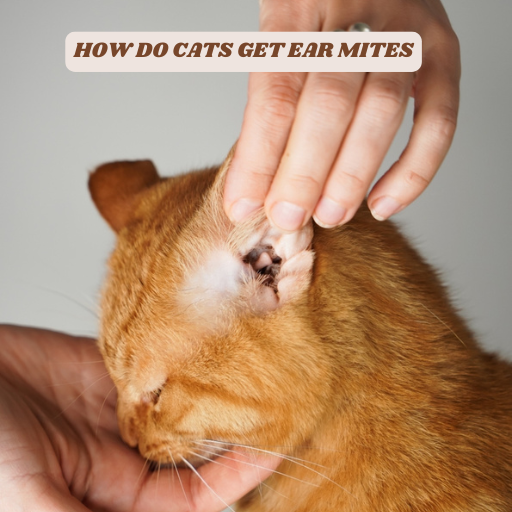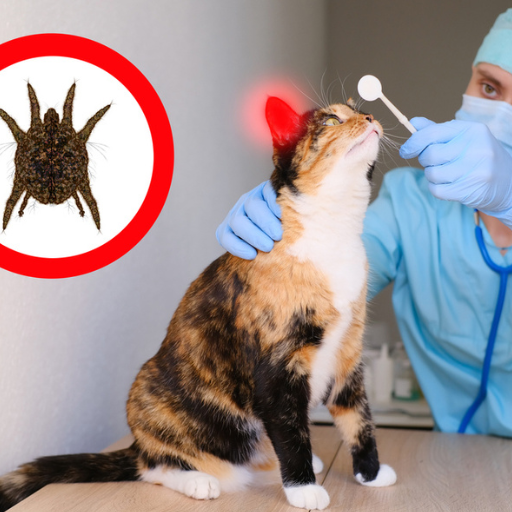How Do Cats Get Ear Mites?
Ear mites are tiny parasites that can cause a lot of discomfort for your cat. They are common in felines and, if left untreated, can lead to serious ear infections. Knowing how cats get ear mites, the symptoms to look out for, and how to treat them is essential for every cat owner.
What Are Ear Mites?
Ear mites, scientifically known as *Otodectescynotis*, are microscopic pests that live in the ear canals of cats. These parasites feed on ear wax, oils, and skin debris inside the ear, causing inflammation and irritation. Ear mites are highly contagious and can spread from one animal to another, especially in multi-pet households or in outdoor environments.
How Do Cats Get Ear Mites?

Cats get ear mites primarily through direct contact with an infected animal. The most common sources are:
Other Cats or Dogs: If your cat comes into contact with a pet that already has ear mites, the mites can easily transfer.
Outdoor Exploration: Cats that roam outdoors are more prone to getting ear mites. Stray animals, wild creatures, and even contaminated surfaces can be a source.
Grooming Tools and Bedding: Ear mites can survive outside the ear for a short time, so contaminated grooming brushes, bedding, or blankets may transfer mites to your cat.
Symptoms of Ear Mites in Cats
Ear mites can be very irritating for cats. Here are some signs that your cat may have ear mites:
Frequent Head Shaking: Cats with ear mites will shake their heads constantly in an attempt to dislodge the mites.
Scratching at Ears: Mites cause itching, and your cat may scratch at their ears excessively.
Dark, Crusty Ear Discharge: One of the most common signs of ear mites is a dark, crumbly discharge that looks similar to coffee grounds.
Odor from the Ears: An unpleasant smell from your cat’s ears can indicate an ear mite infection or secondary infection.
Red, Inflamed Ears: Ear mites cause irritation that can lead to inflammation and redness inside the ear.
Loss of Balance: In severe cases, if the infection spreads, it may affect the cat’s balance and coordination.
How to Treat Ear Mites in Cats?
Treating ear mites is relatively straightforward, but it’s important to act quickly to prevent further discomfort or complications for your cat.
- Clean the Ears: Before applying medication, gently clean your cat’s ears with a vet-recommended ear cleaner. This helps remove debris and allows the treatment to work more effectively.
- Medications: Over-the-counter or prescription medications, like ear drops or ointments, are used to kill the mites. Make sure to follow your vet’s instructions carefully.
- Veterinary Check-Up: If symptoms persist or worsen, visit your vet. In some cases, your cat may need additional treatment or antibiotics for any secondary infections.
- Treat Other Pets: Because ear mites are contagious, it’s important to check and treat any other pets in your household to prevent infestation.
5.Maintain a Clean Environment: Wash your cat’s bedding, toys, and any other items they come into contact with during the treatment period.
Preventing Ear Mites in Cats
Preventing ear mites is always better than dealing with an infestation. Here are some steps you can take to reduce the risk of ear mites:
Check your cat’s ears regularly for signs of mites or infection. Early detection can help you treat the problem before it gets worse.
Routine Grooming: Regular grooming and cleaning can help keep your cat’s ears free of dirt, wax, and parasites.
Limit Outdoor Exposure: If possible, limit your cat’s outdoor time or monitor them to reduce the chances of them coming into contact with infected animals.
Clean Living Spaces: Keep your home clean and ensure that your cat’s bedding and toys are regularly washed to prevent mite infestations.
Interesting Facts About Cats and Ear Mites
Did you know that ear mites are more common in kittens than adult cats? This is because their immune systems are still developing.
Cats can tolerate a certain number of mites without showing symptoms. However, an infestation can quickly cause discomfort and complications.
Ear mites are not just a problem for cats! Dogs, rabbits, and ferrets can also be infected by the same species of ear mites.
Unlike fleas, ear mites don’t live outside of the host for long, but they can still survive on carpets, furniture, or blankets for a short period.
FAQs About Cats and Ear Mites
- Can ear mites in cats spread to humans?
No, ear mites are specific to animals like cats, dogs, and rabbits. They are not considered contagious to humans.
- How long does it take to get rid of ear mites in cats?
With proper treatment, ear mites can usually be eliminated within 7-10 days. It’s important to follow up with your vet to ensure the infection is fully cleared.
- Can ear mites cause deafness in cats?
If left untreated, severe ear mite infestations can lead to infections that may damage the ear canal or even affect a cat’s hearing.
- Do indoor cats get ear mites?
Yes, indoor cats can still get ear mites if they come into contact with another infected animal or contaminated surfaces.
- How can I tell the difference between ear mites and an ear infection?
While both conditions may cause similar symptoms like itching and discharge, ear mites often produce dark, coffee-ground-like debris, whereas infections may produce different kinds of discharge. Always consult your vet to determine the exact cause.
Bottom Line
Ear mites in cats are a common issue, but with proper care, they can be easily treated and prevented. Regular ear checks, cleanliness, and prompt treatment will ensure your cat stays happy and healthy. Always consult your veterinarian if you’re unsure about any symptoms or treatments, and keep an eye out for signs of ear mites, especially if your cat spends time outdoors or with other animals.
By understanding how cats get ear mites and how to prevent them, you can keep your feline friend’s ears free from discomfort and infection.




Post Comment